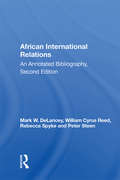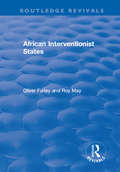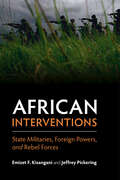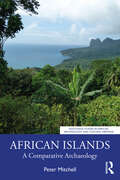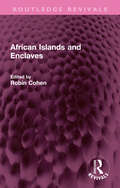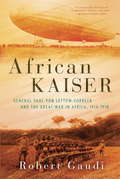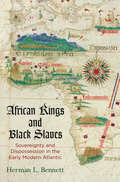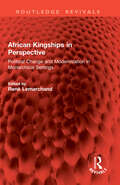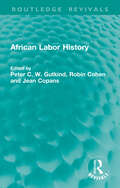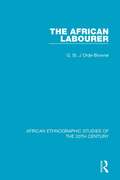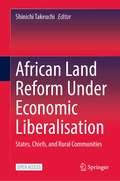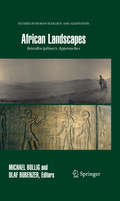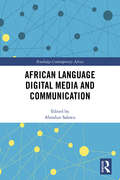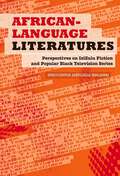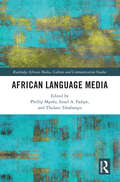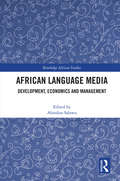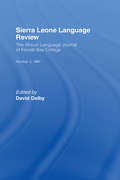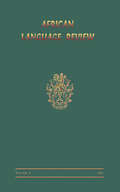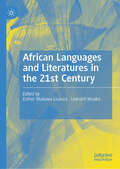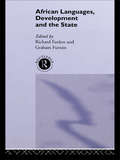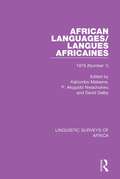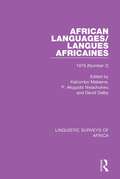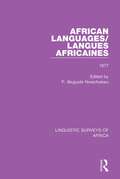- Table View
- List View
African International Relations: An Annotated Bibliography, Second Edition (African Humanities Ser.)
by Mark W. DeLanceyAfrican International Relations is a thoroughly revised and updated bibliography that contains annotated entries for international books and journal articles in the field of African international relations.
African Interventionist States (Routledge Revivals)
by Roy May Oliver FurleyThis title was first published in 2002: Examining the recent phenomenon in conflicts in Africa, this text addresses situations where African states and African military intervene in conflicts either in neighbouring states or beyond. While this trend has been widely observed, this is the first in-depth research that deals with such issues. It breaks new ground in identifying the key issues, actors and actions, and includes analysis of military capacities of African states and the way in which armies are used, including the increasing role of private security companies and mercenaries. The changing attitudes among members of the OAU are examined, in particular the increasing acceptance of interventionism and the blurring of boundaries. The most significant cases of intervention are examined together with less well-documented examples such as Lesotho and Guinea Bissau. This engaging account makes for a compelling resource for academics and practitioners alike.
African Interventions: State Militaries, Foreign Powers, and Rebel Forces
by Emizet F. Kisangani Jeffrey PickeringForeign military intervention has had a profound impact on post-colonial African history and politics. Interventions have destabilized borderlands, overthrown governments, and taken a devastating toll on populations. Emizet F. Kisangani and Jeffrey Pickering advance a new theoretical framework and combine quantitative, qualitative, and historical methods to shed fresh light on these important but understudied events. Their detailed analysis brings understanding to supportive and hostile interventions and to interventions by former colonial states, non-colonial foreign actors, and African countries. Kisangani and Pickering also analyse military incursions into ungoverned territories and lands engulfed in civil war. Showcasing a variety of examples from the Second Congo War to the Ethiopian-Eritrean conflict, the book offers a rich and accessible examination of military intervention on the continent.
African Islands: A Comparative Archaeology (Routledge Studies in African Archaeology and Cultural Heritage)
by Peter MitchellAfrican Islands provides the first geographically and chronologically comprehensive overview of the archaeology of African islands. This book draws archaeologically informed histories of African islands into a single synthesis, focused on multiple issues of common interest, among them human impacts on previously uninhabited ecologies, the role of islands in the growth of long-distance maritime trade networks, and the functioning of plantation economies based on the exploitation of unfree labour. Addressing and repairing the longstanding neglect of Africa in general studies of island colonization, settlement, and connectivity, it makes a distinctively African contribution to studies of island archaeology. The availability of this much-needed synthesis also opens up a better understanding of the significance of African islands in the continent's past as a whole. After contextualizing chapters on island archaeology as a field and an introduction to the variety of Africa’s islands and the archaeological research undertaken on them, the book focuses on four themes: arriving, altering, being, and colonizing and resisting. An interdisciplinary approach is taken to these themes, drawing on a broad range of evidence that goes beyond material remains to include genetics, comparative studies of the languages, textual evidence and oral histories, island ecologies, and more. African Islands provides an up-to-date synthesis and account of all aspects of archaeological research on Africa’s islands for students and academics alike.
African Islands and Enclaves (Routledge Revivals)
by Robin CohenSmall territories and islands are significant flashpoints in the contemporary world order. They are both exposed to the vicissitudes of international power rivalries and can find it difficult to sustain a stable internal political and economic order. Originally published in 1983 this book provides a balance between enclaves and islands, between Indian and Atlantic Ocean territories and between territories that were self-governing and those that were still integrated into metropolitan political units. Each of the authors shares a close familiarity with the territories they surveyed: one that goes into a direct and sometimes brutal appreciation of the difficulties and realities of constructing a modern life in such limiting contexts
African Kaiser: General Paul von Lettow-Vorbeck and the Great War in Africa, 1914-1918
by Robert GaudiThe incredible true account of General Paul von Lettow-Vorbeck and his exploits in World War I Africa with the legendary "Schutztruppe." As World War I ravaged the European continent, a completely different theater of war was being contested in Africa. And from this very different kind of war, there emerged a very different kind of military leader...At the beginning of the twentieth century, the continent of Africa was a hotbed of international trade, colonialism, and political gamesmanship. So when World War I broke out, the European powers were forced to contend with each other not just in the bloody trenches—but in the treacherous jungle. And it was in that unforgiving land that General Paul von Lettow-Vorbeck would make history.With the now legendary "Schutztruppe" (Defensive Force), von Lettow-Vorbeck and a small cadre of hardened German officers fought alongside their fanatically devoted native African allies as equals, creating the first truly integrated army of the modern ageThe Lion of Africa is the almost-forgotten true account of Wiemar Germany’s military escapades on the dark continent. A story of thousand-mile marches through the harshest landscapes; of German officers riding bicycles into battle through the bush; of battleships hidden in jungle rivers teeming with crocodiles; of improbable Zeppelin voyages; of desperate men living off hippo lard and facing dangers in both man and nature.But mostly it is the story of von Lettow-Vorbeck—the only undefeated German commmander in the field during World War I, and the last to surrender his arms in final defeat.
African Kings and Black Slaves: Sovereignty and Dispossession in the Early Modern Atlantic (The Early Modern Americas)
by Herman L. BennettAs early as 1441, and well before other European countries encountered Africa, small Portuguese and Spanish trading vessels were plying the coast of West Africa, where they conducted business with African kingdoms that possessed significant territory and power. In the process, Iberians developed an understanding of Africa's political landscape in which they recognized specific sovereigns, plotted the extent and nature of their polities, and grouped subjects according to their ruler.In African Kings and Black Slaves, Herman L. Bennett mines the historical archives of Europe and Africa to reinterpret the first century of sustained African-European interaction. These encounters were not simple economic transactions. Rather, according to Bennett, they involved clashing understandings of diplomacy, sovereignty, and politics. Bennett unearths the ways in which Africa's kings required Iberian traders to participate in elaborate diplomatic rituals, establish treaties, and negotiate trade practices with autonomous territories. And he shows how Iberians based their interpretations of African sovereignty on medieval European political precepts grounded in Roman civil and canon law. In the eyes of Iberians, the extent to which Africa's polities conformed to these norms played a significant role in determining who was, and who was not, a sovereign people—a judgment that shaped who could legitimately be enslaved.Through an examination of early modern African-European encounters, African Kings and Black Slaves offers a reappraisal of the dominant depiction of these exchanges as being solely mediated through the slave trade and racial difference. By asking in what manner did Europeans and Africans configure sovereignty, polities, and subject status, Bennett offers a new depiction of the diasporic identities that had implications for slaves' experiences in the Americas.
African Kingships in Perspective: Political Change and Modernization in Monarchical Settings (Routledge Revivals)
by René LemarchandFirst published in 1977, African Kingships in Perspective deals comparatively and analytically with the dynamics of change in monarchical settings. It examines the variant responses of African kingships to the challenge of modernity and political centralisation, and to assess their successes and failures in the face of rapid social change. The analysis is based on eight case studies: Ethiopia, Buganda, Ankole, Rwanda, Burundi, Ijebu Ode, Swaziland and Lesotho – covering a wide range of historical experiences and social settings. By looking at the relative staying power and adaptability of these traditional polities, the editor reveals the structural regularities behind variations of culture, leadership, and historical experience.The case studies included in this book also demonstrate the vital importance of monarchical symbols, leadership patterns, and strategic maneuverings for an understanding of the durability and viability of African kingships. It further shows how the actions of individual monarchs may have contributed to the survival or demise of their respective kingdoms, taking into account the obstacles arising from structural and environmental constraints. The institution of kingship thus emerges as a significant variable in the analysis of political change in contemporary Africa. This book stands as an important contribution to the political anthropology of contemporary Black Africa.
African Labor History (Routledge Revivals)
by Peter C.W. Gutkind Robin Cohen Jean CopansOriginally published in 1978, this book was distinctive in translating the work of French labour specialists and includes chapters on Nigeria, South Africa, Senegal, Kenya, Tanganyika, Madagascar and Botswana. Although all the papers are set in historically specific events, some of the larger issues receive further treatment. These concern the reality of the existence of an African working class and its class identity and consciousness. Each contributor adds to the debate by means of demonstrating how African workers have responded to their work situation, to deprivation and exploitation, and to the political authority of the colonial or neocolonial state
The African Labourer
by G. St. Orde-BrowneOriginally published in 1933, this book is a comparative study of the labour market in the early part of the twentieth century in different parts of Africa. It focusses particularly on the impact of Western influence, both on an industrial and sociological level, in the period after the First World War. The book takes as its area central and southern parts of Africa, as well as the West Coast.
African Land Reform Under Economic Liberalisation: States, Chiefs, and Rural Communities
by Shinichi TakeuchiThis open access book offers unique in-depth, comprehensive, and comparative analyses of the motivations, context, and outcomes of recent land reforms in Africa. Whereas a considerable number of land reforms have been carried out by African governments since the 1990s, no systematic analysis on their meaning has so far been conducted. In the age of land reform, Africa has seen drastic rural changes. Analysing the relationship between those reforms and change, the chapters in this book reveal not only their socio-economic outcomes, such as accelerated marketisation of land, but also their political outcomes, which have often been contrasting. Countries such as Rwanda and Mozambique have utilised land reform to strengthen state control over land, but other countries, such as Ghana and Zambia, have seen the rise in power of traditional chiefs in managing the land. The comparative perspective of this book clarifies new features of African social changes, which are carefully investigated by area experts. Providing new perspectives on recent land reform, this book will have a considerable impact on scholars as well as policymakers.
African Landscapes: Interdisciplinary Approaches (Studies in Human Ecology and Adaptation #4)
by Michael Bollig Olaf BubenzerLandscape studies provide a crucial perspective into the interaction between humans and their environment, shedding insight on social, cultural, and economic topics. The research explores both the way that natural processes have affected the development of culture and society, as well as the ways that natural landscapes themselves are the product of historical and cultural processes. Most previous studies of the landscape selectively focused on either the natural sciences or the social sciences, but the research presented in African Landscapes bridges that gap. This work is unique in its interdisciplinary scope. Over the past twelve years, the contributors to this volume have participated in the collaborative research center ACACIA (Arid Climate Adaptation and Cultural Innovation in Africa), which deals with the relationship between cultural processes and ecological dynamics in Africa's arid areas. The case studies presented here come from mainly Sahara/Sahel and southwestern Africa, and are all linked to broader discussions on the concept of landscape, and themes of cultural, anthropological, geographical, botanical, sociological, and archaeological interest. The contributions in this work are enhanced by full color photographs that put the discussion in context visually.
African Language Digital Media and Communication (Routledge Contemporary Africa)
by Abiodun SalawuWhile some academic attention has been paid to the impact of new digital technologies on African media in the colonial languages of English, French and Portuguese, there is a dearth of research into African language digital communication. This book analyses the online presence of African language media. The chapters in the book focus on the speed, structure, content, navigation and interactivity, operations and performance, and audience of the online media. They also pay particular attention to how social media such as Facebook, Twitter and WhatsApp have been appropriated by African language media. Using a wide range of case studies, the contributors assess the challenges of adopting digital technologies by the media, and how the technologies have impacted journalistic practice and media operations.Examining the ability of the African language press to adopt new technologies, this book will be of interest to scholars of media, journalism, communication, social media and culture in Africa.
African-Language Literatures: Perspectives on isiZulu fiction and popular black television series
by Innocentia Jabulisile MhlambiAfrican-language writing is in crisis. The conditions under which African writing developed in the past (only remotely similar to those of Western models), resulted in an inability of Eurocentric literary models to explore the hermeneutic world of African language poetics inherited from the oral and the modern worlds. Existing modes of criticism in the study of this literary tradition are often unsuited for a nuanced understanding of the intrinsic and extrinsic aspects at play in the composition, production and reading of these literatures. In African-Language Literatures, Innocentia Jabulisile Mhlambi charts new directions in the study of African-language literatures generally and isiZulu fiction in particular by proposing that African popular arts and culture models be considered as a logical solution to current debates and challenges. Mhlambi shows how the popular arts and culture approach brings into relationship the oral and written forms, the local and the international, and elitist and popular genres, and locates and places the resultant emerging, eclectic culture into its socio-historical context. She uses this theoretical approach to explore – in a wide range of cultural products – what matters or what is of interest to the people, irrespective of social hierarchies and predispositions. It is her contention that, in profound ways the African-language literary tradition evinces diversity, complexity and fluidity, and that this should be seen as an invitation to look at systems of meaning which do not hide their connections with the facts of power and material life.
African Language Media (Routledge African Media, Culture and Communication Studies)
by Phillip Mpofu, Israel A. Fadipe, and Thulani TshabanguThis book outlines how African language media is affected by politics, technology, culture, and the economy and how this media is creatively produced and appropriated by audiences across cultures and contexts. African language media can be considered as a tool for communication, socialization, and community that defines the various identities of indigenous people in Africa. This book shows how vernacular media outlets including radio and television, as well as native formats such as festivals, rituals and dance, can be used to influence all facets of local peoples’ experience and understanding of community. The book also explores the relationship between African language media sources and contemporary issues including the digitalization conundrum, peace and conflict resolution, identity formation, hate speech and fake news. Furthermore, it shows how local media can be used for development communication purposes during health and environmental crises. The book includes cases studies demonstrating the uses, experiences and activities related to various forms of media available in African languages. This book will be of interest to scholars in the field of communication and media studies, health and environmental communication, journalism, African studies and anthropology.
African Language Media: Development, Economics and Management (Routledge African Studies)
by Abiodun SalawuThis edited volume considers why the African language press is unstable and what can be done to develop quality African language journalism into a sustainable business. Providing an overview of the African language journalism landscape, this book examines the challenges of operating sustainable African language media businesses. The chapters explore the political economy and management of African language media and consider case studies of the successes and failures of African language newspapers, as well as the challenges of developing quality journalism. Covering print and digital newspapers and broadcast journalism, this book will be of interest to scholars of media and journalism in Africa.
African Language Review
by David DalbyFirst published in 1967. Routledge is an imprint of Taylor & Francis, an informa company.
African Language Review
by David DalbyFirst published in 1971. The Sierra Leone Language Review is the African Language Journal of Fourah Bay College, the University College of Sierra Leone. The Journal is devoted to the detailed study of languages in Sierra Leone and neighbouring areas of West Africa, and also to the more general study and discussion of African languages and language-problems
African Language Review
by David DalbyFirst published in 1971. The Sierra Leone Language Review is the African Language Journal of Fourah Bay College, the University College of Sierra Leone. The Journal is devoted to the detailed study of languages in Sierra Leone and neighbouring areas of West Africa, and also to the more general study and discussion of African languages and language-problems
African Languages and Literatures in the 21st Century
by Esther Mukewa Lisanza Leonard MuakaThis edited book examines the crucial role still played by African languages in pedagogy and literatures in the 21st century, generating insights into how they effectively serve cultural needs across the African continent and beyond. Boldly positioning African languages as key resources in the 21st century, chapters focus on themes such as language revolt by marginalized groups at grassroots level, the experience of American students learning African languages, female empowerment through the use of African languages in music, film and literary works, and immigration issues. The contributions are written by scholars of language, literature, education and linguistics, and the book will be of interest to students and scholars in these and related areas.
African Languages, Development and the State (Eidos (inter-university Development Opportunities Study Group) Ser.)
by Richard Fardon Graham FurnissThis shows that multilingusim does not pose for Africans the problems of communication that Europeans imagine and that the mismatch between policy statements and their pragmatic outcomes is a far more serious problem for future development
African Languages/Langues Africaines: Volume 5 (1) 1979 (Linguistic Surveys of Africa #27)
by Kahombo Mateene P. AkụJụobi Nwachukwu David DalbyVolume 5 (1) of African Languages originally published in 1979, is a special issue focussing on the Bantu languages in Tanzania. The languages are discussed according to 4 regions of Tanzania and although the sub-grouping is lexicostatistical, the classification is borne out by other consdierations, such as phonology and verbal morphology.
African Languages/Langues Africaines: Volume 5 (2) 1979 (Linguistic Surveys of Africa #28)
by Kahombo Mateene P. AkụJụobi Nwachukwu David DalbyVolume 5 (2) of African Languages originally published in 1979, is a special issue focussing on languages and education in Africa. There are chapters on African language education from a socio-linguistic perspective, the problems of bi-lingualism and multi-lingualism in Zaire and small languages in primary education.
African Languages/Langues Africaines: Volume 3 1977 (Linguistic Surveys of Africa #25)
by P. AkỤJỤobi NwachukwuVolume 3 of African Languages includes articles originally published in 1977, written in French and English on educational, literary, cultural, historical and socio-linguistic aspects of language in Africa, as well as descriptive and comparative studies. Among others there are chapters on the national language issue in Africa (Akan in Ghana), a socio-linguistic case study of the Hausa language in Nigeria and assimiliation and lexical coinages in Igbo.
